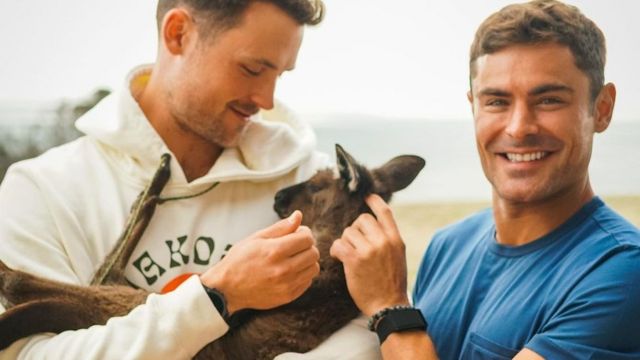
Image source, ZAC EFRON / INSTAGRAM
Zac Efron was one of the first Hollywood stars to make Australia his home during epidemics.
It all started with the arrival of actor Zac Efron. Mark Wallberg followed, and then Matt Damon and dozens of other celebrities made Australia their home during epidemics.
Most recently, Julia Roberts arrived. He plans to shoot a film with George Clooney later this year, Tickets to heaven.
In the midst of the Govt-19 epidemic, half of Hollywood seems to have gone to that country Whom do they see a Location IDIlIgo Corona virus free.
Life is good because the virus is often removed: people enjoy beaches, bars and nightclubs freely.
Many actors have come to work as the Australian government has attracted big productions like the next film Thor, Through tax concessions.
That is the reason The Celebrities are seen on the streets, in particular Sydney: Idris Elba was seen on stage at a show; Natalie Portman Shopping in Pondicherry; Chris Broad dining at a hotel; And Zac Efron having lunch at a Korean barbecue restaurant in Chinatown.
The attendance list also includes Awkwafina, Ed Sheeran, Jane Seymour, Melissa McCarthy, Michael Yeh, Paul Meskel, Rita Ora, Ron Howard, Taika Waite, Tessa Thompson, Tilda Swindon and Tom Hanks.
Also returning home are Australian stars: Nicole Kidman, Keith Urban, Kylie and Danny Minogue, Rose Byrne, Isla Fisher and her husband Sacha Baron Cohen.
“They call it Osiwood,” a local entertainment reporter told the BBC.
Image source, Reuters / Getty Images / EPA / BBC
All of these celebrities went to Australia last year.
But still Not everyone is happy In the presence of celebrities.
A year after Australia closed its borders, it is still There are at least 40,000 Australians abroad.
Many say it prevented them from returning home. A group has lodged a human rights complaint with the United Nations.
Sabrina Thiasha, who returned home from the UK last month, said: “No other country has prevented its citizens from returning this way.
Why is this happening?
Australia’s border controls have deprived many citizens of the right to fly home.
Last year, the government imposed a “Travel limit” To International visit, With the aim of reducing the risk of corona virus outbreak.
It refers to Flights to Australia, in many cases, are reduced to just 40 passengers. The cap has increased ticket costs and prompted flights to prioritize first-class destinations.
For example, flights from the UK to Australia They cost between $ 2,300 and $ 11,400, This will drown many people even in their savings and pension funds.
There is also a hotel charge for compulsory isolation when they arrive: 3 2,300 per person.
Image source, Sabrina Thiasha / Facebook
Passengers have shown that commercial flights to Australia are almost empty.
It is rare to find aircraft as it was before the epidemic. Even those who get more tickets can stay without traveling if the plane sells too much.
“Six months later I can say this for sure: there is no system,” says Thiasha. “There’s no way to find out what’s going on or plan a flight.”
The government says it has arranged for more than 100 return flights, including 20 this year.
But tens of thousands of Australians have yet to return home, Anger has increased due to lack of support Of the government.
They scream for help
More than a dozen citizens stranded abroad told the BBC they had received little help from Australian authorities.
Margaret and David Sparks, a 70-year-old couple, were on vacation in the UK when the epidemic struck. Trapped for almost a year.
“People are depressed and scared enough to pay any amount to come home. But as retirees, we need to think more about the cost,” Sparks told the BBC earlier this year.
They had three flight cancellations before finding a return flight last month.
Image source, John Y. Margaret Sparks
John and Margaret Sparks spent more than a year in the UK, never to return to Australia.
In Facebook groups, stranded Australians advise each other to prepare their bags. The lucky ones give details of how they overcame the obstacles to going home.
“Keep your phone in the ring all night long to pick up calls at any time if a last-minute flight arrives,” one wrote.
Hundreds have asked for help. They want to go home for pessimistic reasons: To care for sick or dying relatives; Because they have lost their job or home; Or because the cost of being separated from loved ones has become enormous.
Rights debate
Some believe that government policy violates their human rights.
International law dictates citizens They have the right to return to their country. This is a policy often used in refugee cases.
A group called the Stranded Australians Abroad Petition to the UN Human Rights Council Asks for your intervention.
But experts warn that much cannot be done without a similar guarantee under Australian law.
Image source, Chris Hemsworth / Instagram
Actors such as Chris Hemsworth, Idris Elba and Matt Damon were seen at parties in Australia.
According to Ben Saul, a professor at the University of Sydney, a serious case like “an Australian ending up homeless” could show that restricting passengers is unnecessarily punishable.
Other family experts say family divisions continue Infringes rights The ChildS.
Saul believes Australia can legislate to make things better, such as airlines that prioritize access to vulnerable citizens.
Meanwhile, the government considers that the cost of going home depends on the airlines.
“[Nuestra] One priority at the moment is to help Australians abroad, “a Foreign Ministry spokesman told the BBC. Helped bring back more than 39,000 citizens Since the onset of the epidemic.
“Different treatment for the rich”
However, critics argue that the government has pursued more flexible policies for celebrities.
The government halved travel restrictions in January, citing the threat of UK diversity. But days later More than 1,700 tennis players, support staff and others were allowed to enteraS Members LinkaTo the Australian Open.
“They preferred a tennis match to their own citizens,” says Thiasha.
Image source, Reuters
Passengers have to send an isolation to a hotel, which celebrities have avoided with special permissions.
Other controversies have arisen. Isolation in a hotel is what everyone wants, but Many stars have received exemptions.
Julia Roberts and Ed Sheeran are isolated on a luxury farm in a Sydney suburb. Damon, Kidman and Danny Minogue also agreed to keep private isolations.
Sydney Morning Herald reporter Andrew Hornary said: “Celebrities are in their private mansion.”
British billionaire Lord Sugar flew in first class last July to film a TV show. It was a great experience, he tweeted that he had only traveled on a private jet before.
That same week, reports from Australians came in Camped at London Heathrow Airport, After kicking planes.
Image source, Natalie Portman / Instagram
Actress Natalie Portman and her husband Benjamin Millibeat enjoyed the Blue Mountains west of Sydney.
A woman posted a photo of herself sleeping on the floor of her children’s terminal; They couldn’t go anywhere else and said that post had gone viral. Then got a flight home.
“Rich or celebrities have 100% different treatment compared to ordinary people,” says Kanisha Patti, an Australian who was granted a visa extension in the UK.
He joked that deportation was the quickest way home.
Damien Eisenach, who is stranded in Peru, agrees It looks like a “two-tier system”.
“Tennis players and celebrities have a lot of support, on the other hand people have zero support,” he says.
Now you can get notifications from BBC Mundo. Download the latest version of our app and activate them so you don’t miss out on our great content.

“Proud explorer. Freelance social media expert. Problem solver. Gamer. Extreme travel aficionado.”

